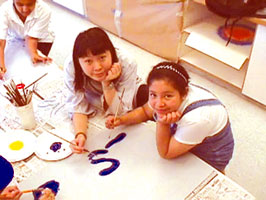|

Students
Teaching Students: Summerbridge at the Town School
By
Marie Holmes
“I
was really scared,” says Rachel Berk, recalling her first day
of teaching. “I felt like I was kind of out of my element.”
Like many new teachers, she had come into New York City from the
suburbs, unsure of exactly what she had gotten herself into.
On this nerve-wracking first day of class, the teacher was 17
years old.
Berk was a faculty member at Summerbridge at the Town School:
A Breakthrough Program, a year-long effort to help prepare middle-school
students for high-school. The program’s focus is a full-time summer
school session, housed in the private Upper East Side elementary
school in New York City.
A second goal of the program, and its defining characteristic,
is to encourage young people to enter the field of education –
not with scholarship money or loan deferment, but by throwing
them into the classroom.
Last year’s Summer staff included students, most originally from
New York City, who attend 18 different colleges and universities
including NYU, the University of Chicago, Harvard, and the John
Jay College of Criminal Justice. Summerbridge teaching alums have
gone on to the Peace Corps, Teach for America and other fast-track
certification programs.
One student switched her major from finance to education after
teaching at Summerbridge.
Berk, who comes from a family of teachers, says that she came
to Summerbridge to “prove to myself that I didn’t want to be a
teacher – and the exact opposite happened.” Now a first-year at
NYU, she plans to major in education.
Motivated students, a 7:1 student-teacher ratio, and a team-teaching
model seem sufficient to turn dedicated young people into effective
teachers.
“What
they lack in experience they make up for in enthusiasm,” says
Sam Marks, the program director.
Berk also credits the sense of community that the program fosters
among its faculty. “For me it worked because the support was there,”
she says. “My favorite part of Summerbridge is when I feel like
we’re working together and I’m not just alone as a teacher.”
The success of the program also hinges on the creativity of its
staff, who all design their own elective courses. Examples include
Comics as Literature, the History of Hip-Hop, and To Infinity
and Beyond – an entire course devoted to the intangible mathematical
concept.
One of the benefits of being a Summerbridge student, says Marks,
is “being involved in this peer group that really cares about
learning,” particularly since middle-school students have difficulty
relating their schoolwork to their futures.
“The
teachers,” says Jennifer Chicon, a ninth-grader who has been a
Summerbridge student for the past two years, “are also students
– they can relate to the same things we’re going through.”
Summerbridge recruits its students from 10 different middle-schools
in East Harlem, the Upper West Side and the Lower East Side, resulting
in an ethnically diverse group.
“We
target students who can demonstrate that this would be a great
opportunity for them,” explains Marks. Because Summerbridge is
tuition-free, they also seek out students who wouldn’t have the
opportunity to attend other summer programs.
Students make a two-year commitment to attend the summer sessions
as well as weekly tutoring and monthly Saturday School events
throughout the school year. When they are in the 8th grade, Summerbridge
staff aid students and their families in the high-school application
process. Most remain in the public school system.
While there are a number of programs that aid low-income students
gain admission to private schools, this is not one of Summerbridge’s
goals. “Where [the students] end up is not the story we tell,”
says Marks.
In addition to the intriguing elective courses, which Chicon says
make the experience “much more fun,” students are also required
to take English, math and writing classes.
Berk says that she watched her students’ writing skills improve
dramatically over the course of the summer, and Chicon credits
the personalized instruction she got at Summerbridge with improving
her understanding of math.
What struck Berk most, however, was the change she saw in her
students’ confidence levels. As the summer progressed, she says,
even the more shy students began to “get up and read their writing,
to raise their hands and argue, to speak their own ideas in front
of people.”
“The
program,” adds Berk, “provides a safe environment for the kids
to express themselves and their opinions.” Berk’s own experience
shows that Summerbridge gives future teachers an opportunity to
test the waters without feeling that they are doomed to either
sink or swim.
The first Summerbridge program, which was established at the University
High School in San Francisco in 1978, has grown into a national
network, soon to be known as Breakthrough, which currently serves
students in 26 locations in the US. The Town School began hosting
its program in 1999, several years after New York City’s first
Summerbridge program was established in the Bronx.#
Education Update, Inc., P.O. Box 20005, New York, NY 10001. Tel:
(212) 481-5519. Fax: (212) 481-3919. Email: ednews1@aol.com.
All material is copyrighted and may not be printed without express consent of
the publisher. © 2001.
|

